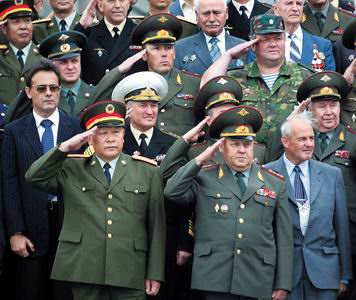
Liang Guanglie (left front), chief of the General Staff of the
Chinese People's Liberation Army, and his Russian counterpart Yury Baluyevsky
(right front) inspect a guard of honor yesterday at the opening of war games in
the Russian port city Vladivostok. The military exercises will run for
eight days. - Xinhua
Chinese and Russian troops opened eight days of military exercises in the
Russian coastal city of Vladivostok yesterday - the first time ever the two
nations have engaged in war games with each other.
After conducting a brief
high-level strategic consultation for the exercise, Liang Guanglie, chief of the
General Staff of the Chinese People's Liberation Army and his Russian
counterpart Yury Baluyevsky jointly announced the official commencement of the
military exercises at around 11am in the base of Russia's Pacific Fleet.
The
exercise, code-named "Peace Mission 2005," is scheduled to involve nearly 10,000
troops from the two countries' armies, navies, air forces as well as airborne
units, marine corps and logistic units, according to an earlier announcement
from the Chinese Ministry of Defense.
Four hours after the commencement, the
first phase of the military maneuvers officially started with staff officers
carrying out strategic consultations and battle planning at the order of the
chiefs of the general staff of the two armed forces.
The second and third
stages of the drills will be held in the Shandong Peninsula and nearby offshore
waters in eastern China.
While attending a press conference later in the
morning, Liang denied the military exercise is aimed at any third party,
concerns the interests of any third country or will pose a threat to any
country.
The participating troops will focus on strategic maneuvers and
battle planning, transportation and deployment of troops, and combat practice,
said Liang.
The first Sino-Russia joint military exercises demonstrate the
common will of the two armed forces to safeguard peace and stability in the
region and the world at large, Liang said.
He said the main goal of the
drills is to deepen Sino-Russian cooperation and coordination of the two armed
forces in the areas of defense and security, and help strengthen their
capability in jointly striking international terrorism, extremism and
separatism.
"China is a responsible country and the People's Liberation Army
is a strong force for maintaining world peace ...We are ready to develop
friendly cooperation with the people and armed forces of all countries," Liang
said.
Under the complicated and changing international and regional
situations, strengthening strategic cooperation between China and Russia is
conducive to their joint efforts to deal with new challenges and threats, Liang
added.
Baluyevsky described the joint exercises as a brand-new form of
military cooperation between Russia and China.
"The joint military exercises
reflect the joint efforts of Russia and China to serve peace and stability in
the region and the world at large," said Baluyevsky.
The holding of joint
military exercises does not mean that the two countries want to forge a military
bloc in any form or pose any threat to any other country, Baluyevsky
said.
Russia pays close attention to the stable development of the military
and political situation in the Asia-Pacific region, said Baluyevsky. "From this
standpoint, we are engaged in establishing friendly cooperation with all
countries in the region."
He said cooperation between Russia and China is
growing in an enlarging scale and becoming increasingly comprehensive and active
in a planned way. As members of the Shanghai Cooperation Organization, which
also includes the Central Asian countries of Uzbekistan, Kazakhstan, Kyrgyzstan
and Tajikistan, China and Russia have vowed to work with other members to
maintain regional security and stability and promote regional development and
prosperity, said Liang.
Baluyevsky also stressed the importance to strengthen
antiterror cooperation within the Shanghai Cooperation Organization.
"As one
of the major regional organizations in Asia, the Shanghai Cooperation
Organization is gradually becoming an important factor to consolidate regional
peace and security," he said.
According to Sergey N. Goncharov, charge
d'affaires of the Russian Embassy in China, the forces of terrorism, extremism
and separatism have conducted activities in both China and Russia, and have been
growing in the member countries of the Shanghai Cooperation
Organization.
"Let them have a look at our joint military exercises and think
over whether it is worth continuing their activities," said Goncharov. "We hope
the joint military exercises could help cool down the 'fervor' of these
terrorists, separatists and extremists."



